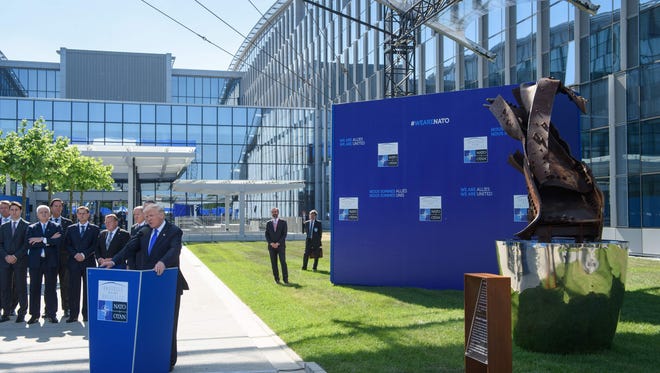Trump's NATO mystery: How much does he support it?

TAORMINA, Italy – President Trump departs Europe this weekend leaving a mystery in his wake: Whether the U.S. truly supports NATO's collective defense mission.
In his highly anticipated speech at North Atlantic Treaty Organization headquarters in Brussels Thursday, Trump did not specifically endorse a core tenet of alliance's treaty that countries will treat attack on one member as an attack on all. Trump's omission of what's known as Article 5 was especially striking considering Trump, who had once called the organization "obsolete" in the age of terror, has never expressly endorsed it – and was widely expected to do so in his foray into Europe as president.
While Trump and aides insisted that he made his commitment to the 68-year-old military alliance very clear, analysts said Trump's speech was, at the very least, a missed opportunity that could cause the still-new American president more problems in the future.
"He failed to mention the one thing that allies were waiting to hear: NATO's Article 5 pledge, that an attack on one is an attack on all," said Julianne Smith, director of the Transatlantic Security Program with the Center for a New American Security.
Now, in the wake of a "tsunami of criticism from both sides of the Atlantic," Smith said that allies "spend months if not years focused on whether or not the United States remains committed to the alliance instead of focusing on important issues like defense spending, counterterrorism, and enhanced deterrence."
Trump, who has embraced what he calls an "America First" foreign policy and views himself as dealmaker-in-chief, did make a strong push for European leaders to spend more on security. With just 23 of NATO's 28 members falling short of their goal of committing 2% of gross domestic product to their national defense, Trump said the U.S. contribution was "not fair to the people and taxpayers of the United States."
Even though alliance members expected Trump to make a spending pitch, critics said Trump appeared tone deaf by demanding countries spend more without also explicitly reinforcing the U.S. commitment to Article 5. Countries' support of NATO missions has gone beyond just the dollar amounts they contribute, some experts noted, pointing to the alliance's longtime support of the United States – especially during the war on terrorism that followed the attacks of September 11, 2001.
Thomas Wright, director of the Center on the United States and Europe at the Brookings Institution, tweeted that "894 European NATO troops died fighting alongside their American comrades in Afghanistan."
Administration officials said they are mystified by the criticism. They described Trump's support as self-evident given the setting of his speech, at a ceremony to dedicate a memorial to Article 5. Located at NATO's new headquarters building, the memorial consists of burnt wreckage from the World Trade Center, destroyed in the 9/11 terrorist attack that triggered the only invocation of Article 5 in NATO history.
"This twisted mass of metal reminds us not only of what we have lost, but also what forever endures: the courage of our people, the strength of our resolve and the commitments that bind us together as one," Trump said. "We will never forget the lives that were lost. We will never forsake the friends who stood by our side."
Declaring himself "perplexed" by reporters questions on the subject, White House spokesman Sean Spicer said, "if you are standing at a ceremony talking about the invocation of Article 5 after 9/11 ... that is a pretty clear indication of the support that exists for it."
In previous weeks, both Vice President Pence and Defense Secretary Jim Mattis made explicit endorsements of Article 5, though it had been widely expected that Trump himself would make this endorsement when the spotlight was on him during this Thursday remarks.
The White House declared the visit a success, citing pledges from NATO countries to increase their own defense spending. "It was a very positive reaction and affirmation of the president's priorities," Spicer said.
Some analysts said Trump's failure to explicitly speak up for Article 5 will make some allies wonder about the president's commitment – considering how he, at one time, described NATO as "obsolete" in a world more threatened by terrorism than by traditional warfare.
The president took back the "obsolete" description after an April meeting with NATO Secretary-General Jens Stoltenberg, but some critics said Trump's silence on the subject will also embolden NATO's enemies, including Russian President Vladimir Putin.
"Putin will be thrilled at Trump's refusal to endorse Article 5," Wright tweeted. "Unimaginable under any other president."
Nicholas Burns, a former U.S. ambassador to NATO, tweeted that "I do think Trump's visit to #NATO was the least effective of any American President since 1949." That was the year the United States and European countries forged the NATO alliance in response to the aggressiveness of the Soviet Union after World War II.
After NATO, Trump flew to the Italian island of Sicily for a Group of 7 nations summit at which counterterrorism is a major topic.
Trump is scheduled to return to Washington on Saturday, where experts will continue to parse his first foreign trip as president.
"Trump's first visit to NATO headquarters could have been an easy win for him and the NATO allies. But instead he blew it," Smith said.